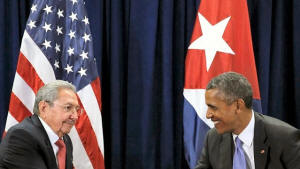|
 With
Havana trip, Obama seeks to make history, lock in Cuba opening With
Havana trip, Obama seeks to make history, lock in Cuba opening
 Send a link to a friend
Send a link to a friend
[March 15, 2016]
By Matt Spetalnick, Jeff Mason and Patricia Zengerle
WASHINGTON (Reuters) - Barack Obama's
historic visit to Havana next week may be the closest he comes to a
Nixon-goes-to-China moment, but he also has another more practical goal:
to make his opening to Cuba irreversible for the next U.S. president.
|
|
 The Obama administration hopes that getting more U.S. companies
invested in Cuba and loosening up travel to the island will make it
almost impossible for traditionally pro-business Republicans to halt
or even roll back the thaw in relations if they win the White House
in November. The Obama administration hopes that getting more U.S. companies
invested in Cuba and loosening up travel to the island will make it
almost impossible for traditionally pro-business Republicans to halt
or even roll back the thaw in relations if they win the White House
in November.
Ahead of his March 20-22 trip to Havana, the stage is set for a
further easing of trade restrictions and a string of business
announcements from the hotel and telecommunications industries and
possibly even Major League Baseball.
"The administration wants to do as much as it can unilaterally
before the clock runs out," said a person who has been briefed on
Obama's strategy.
What remains to be seen, however, is whether Obama can prod Cuba's
prickly Communist government to reciprocate at least with modest
economic reforms that would help ensure his policy sticks.
Cuba's leaders have been slow to loosen their grip on the island's
state-run economy. That plus strict limits that remain under the
U.S. economic embargo against Cuba has made many American firms
wary.
 Obama's critics accuse him of giving up too much in return for too
little from Cuban President Raul Castro and now taking a premature
"victory lap."
But administration officials says deeper U.S. engagement should not
be contingent on concessions from the former Cold War foe, such as
improving its human rights record.
Obama and his advisers insist that his outreach to Havana has a
better chance of sowing the seeds of eventual change than what they
see as a failed U.S. policy of isolation pursued for more than half
a century.
"This is not a matter of providing concessions," Obama told CNN en
Espanol. "This is a matter of us engaging directly with the Cuban
people."
Obama's visit – the first by a U.S. president in 88 years - is meant
to showcase that approach.
But it is also a gamble for a U.S. leader whose strategy of engaging
adversaries has had mixed results. Locking in his Cuba opening would
make it a major piece of his legacy.
JUMP-START
Obama has relied on executive powers to jump-start the normalization
of ties given continued resistance in Congress to lifting the
long-standing U.S. embargo. His challenge is to advance the process
to the point that no successor could unravel it.
Cuba has not figured heavily in the 2016 presidential race but it
could emerge, especially in Florida, a swing state and home to the
largest Cuban-American community. For decades, Cuban-Americans were
broadly opposed to any rapprochement but a younger generation has
warmed to Obama's policy shift.
Democratic candidates Hillary Clinton and Bernie Sanders have
pledged to stick with Obama's opening to Cuba if elected.
Republican frontrunner Donald Trump said last week the old policy
needed to be changed but he would renegotiate with Cuba for a better
deal. His challengers, Ted Cruz and Marco Rubio, both
Cuban-Americans, said they would reverse Obama’s approach
altogether.
Despite that, Obama told CNN en Espanol he believes Congress will
remove the embargo in the next administration, whether Democrat or a
Republican – though he acknowledged there were not yet enough votes.
[to top of second column] |

It would be hard for many Republicans to join any effort to overturn
Obama’s measures if the White House succeeds in green-lighting
enough corporate projects in Cuba, congressional aides said.
AT&T Inc, Starwood Hotels & Resorts Worldwide Inc and Marriott
International Inc are expected to sign deals around the time of
Obama's visit.
Most companies remain cautious, however, because of Cuba's
dual-currency system, rigid labor market and opaque legal system.
"There are still some frustrations," said James Williams, president
of Engage Cuba, a pro-trade lobbying group. "But they are not
insurmountable."
Some of those concerns may be eased if Washington lifts restrictions
on using dollars in Cuba trade transactions, a move that one source
said could come before Obama's trip.
U.S. airlines have already rushed to apply for routes to the island,
and new travel rules set to be announced this week are expected to
make it easier for more Americans to travel to Cuba independently
rather than in group tours. That in turn could boost public support
for normal relations.
Ben Rhodes, an Obama adviser who helped secure the breakthrough with
Cuba in December 2014, said the administration has told Cuban
leaders the impact of U.S. regulatory changes will be limited unless
they do more to reform their economy.
U.S. officials will pay close attention to Cuba's Communist Party
Congress, set to convene in April for the first time since 2011.
Still, they acknowledge that the prospects remain dim for
influencing democratic reform, even though Obama plans to meet
dissidents in Havana.
"We don’t view our steps as the types of things that would cause the
Cuban government to change their political system,” Rhodes told
Reuters.
Communist Party newspaper Granma last week said Cuba would not
renounce its "revolutionary and anti-imperialist ideals."

Some of Obama's critics say the visit itself is validation of
dictatorial rule.
"The only thing that's changed as a result of this opening is that
now the Cuban government has more sources of money from which to
build out their repressive apparatus," Rubio said in a Republican
debate last week.
(Edditional reporting by Daniel Trotta in Havana; Editing by Kieran
Murray)
[© 2016 Thomson Reuters. All rights
reserved.]
Copyright 2016 Reuters. All rights reserved. This material may not be published,
broadcast, rewritten or redistributed. |